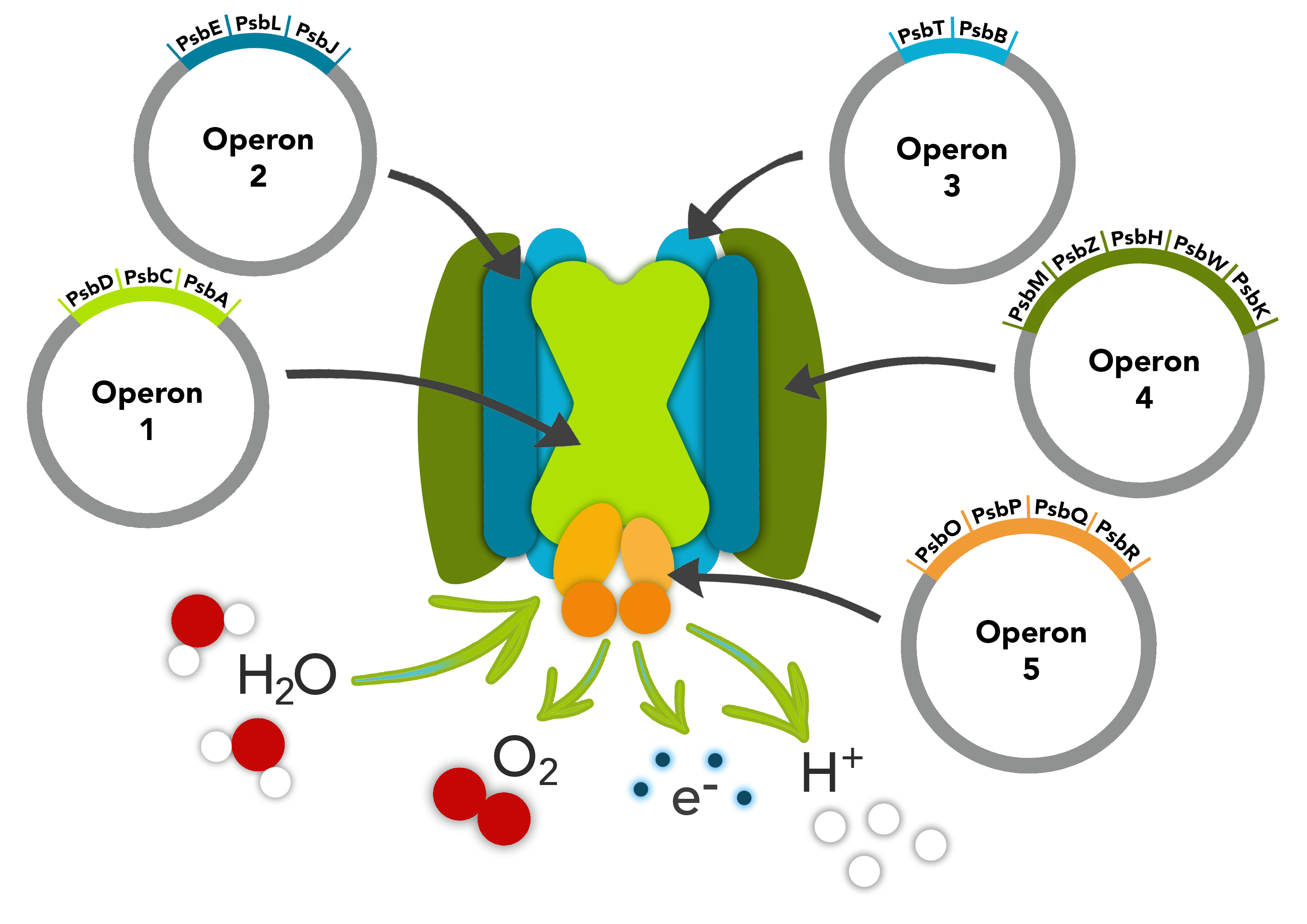Part:BBa_K1998002
psbTB
Sequence and Features
- 10COMPATIBLE WITH RFC[10]
- 12COMPATIBLE WITH RFC[12]
- 21INCOMPATIBLE WITH RFC[21]Illegal BglII site found at 573
- 23COMPATIBLE WITH RFC[23]
- 25COMPATIBLE WITH RFC[25]
- 1000COMPATIBLE WITH RFC[1000]
Overview
This biobrick contains three genes from the photosystem II complex of Chlamydomonas reinhardtii - psbT and psbB. It is driven by a Plac promoter at the beginning of the sequence, with RBS’s preceding each gene, and terminator sequence at the 3' end.
Parts composed in this operon:
psbT - antenna proteins CP47
psbB - photosystem II (PSII) chlorophyll-binding protein
These parts form operon 3 in our photosystem II pathway.

Biology & Literature
The second operon begins with psbT followed by psbB. Parts psbT and psbB make up the light harvesting complex inside the photosystem II complex [1]. They have a close interaction with the psbA and psbD complex helping to provide excitation energy from outer complexes onto them [2]. The psbT protein is a hydrophobic peptide that also has a single transmembrane helix which is associated with the PSII core complex [3] which binds to the complexes D1 and D2 heterodimer [4]. It's location in the core complex is believe to be at the PSII dimer interface [5]. Mutations in the psbT gene indicate that it's expression is not necessarily essential for the function of the PSII complex [4]. The role of psbT in repair of photo-damaged PSII complexes has also been discussed [3]. In addition the psbT gene maintains the stability of QA [5, 6].
The final gene of the composite part is psbB. The psbB protein is associated with the thylakoid membrane and forms part of the inner light harvesting complexes of PSII [7, 8].
Part Verification

Fig 1. Gel electrophoresis of the Photosystem II parts, here psbTB is shown to be the correct size of 1815bp (lane 3) with a cam backbone of 2,070bp, when compaired to 1kb ladder on the gel, which validates the Biobrick parts and backbones.
Protein information
psbT
mass: 3.6kDa
sequence:
MEALVYTFLLVGTLGIIFFSIFFRDPPRMIK
psbB
mass: 56.1kDa
sequence:
MGLPWYRVHTVVINDPGRLISVHLMHTALVSGWAGSMALFEISVFDPSDPVLNPMWRQGMFVLPFMTRLGITQSWGGWTISGETATNPGIWSYEGVAAAHIIL
SGALFLASVWHWTYWDLELFRDPRTGKTALDLPKIFGIHLFLSGLLCFGFGAFHVTGVFGPGIWVSDPYGLTGRVQPVAPSWGADGFDPYNPGGIASHHIAAG
ILGVLAGLFHLCVRPSIRLYFGLSMGSIETVLSSSIAAVFWAAFVVAGTMWYGSAATPIELFGPTRYQWDQGFFQQEIQKRVQASLAEGASLSDAWSRIPEKLAF
YDYIGNNPAKGGLFRTGAMNSGDGIAVGWLGHASFKDQEGRELFVRRMPTFFETFPVLLLDKDGIVRADVPFRKAESKYSIEQVGVSVTFYGGELDGLTFTDP
ATVKKYARKAQLGEIFEFDRSTLQSDGVFRSSPRGWFTFGHVCFALLFFFGHIWHGARTIFRDVFAGIDDDINDQVEFGKYKKLGDTSSLREAF
References
[1] Barber J. Photosystem two. Biochimica et Biophysica Acta (BBA)-Bioenergetics. 1998 Jun 10;1365(1):269-77.
[2] Luciński R, Jackowski G. The structure, functions and degradation of pigment-binding proteins of photosystem II. Acta Biochim Pol. 2006;53(4):693-708.
[3] Monod C, Takahashi Y, Goldschmidt-Clermont M, Rochaix JD. The chloroplast ycf8 open reading frame encodes a photosystem II polypeptide which maintains photosynthetic activity under adverse growth conditions. The EMBO journal. 1994 Jun 15;13(12):2747.
[4]Ohnishi N, Takahashi Y. PsbT polypeptide is required for efficient repair of photodamaged photosystem II reaction center. Journal of Biological Chemistry. 2001 Sep 7;276(36):33798-804.
[5] Ferreira KN, Iverson TM, Maghlaoui K, Barber J, Iwata S. Architecture of the photosynthetic oxygen-evolving center. Science. 2004 Mar 19;303(5665):1831-8.
[6] Ohnishi N, Kashino Y, Satoh K, Ozawa SI, Takahashi Y. Chloroplast-encoded polypeptide psbT is involved in the repair of primary electron acceptor QA of photosystem II during photoinhibition in Chlamydomonas reinhardtii. Journal of Biological Chemistry. 2007 Mar 9;282(10):7107-15.
[7] Barber J, Nield J, Morris EP, Zheleva D, Hankamer B. The structure, function and dynamics of photosystem two. Physiologia plantarum. 1997 Aug 1;100(4):817-27.
[8] Bricker TM, Frankel LK. The structure and function of CP47 and CP43 in photosystem II. Photosynthesis research. 2002 May 1;72(2):131-46.
| None |
